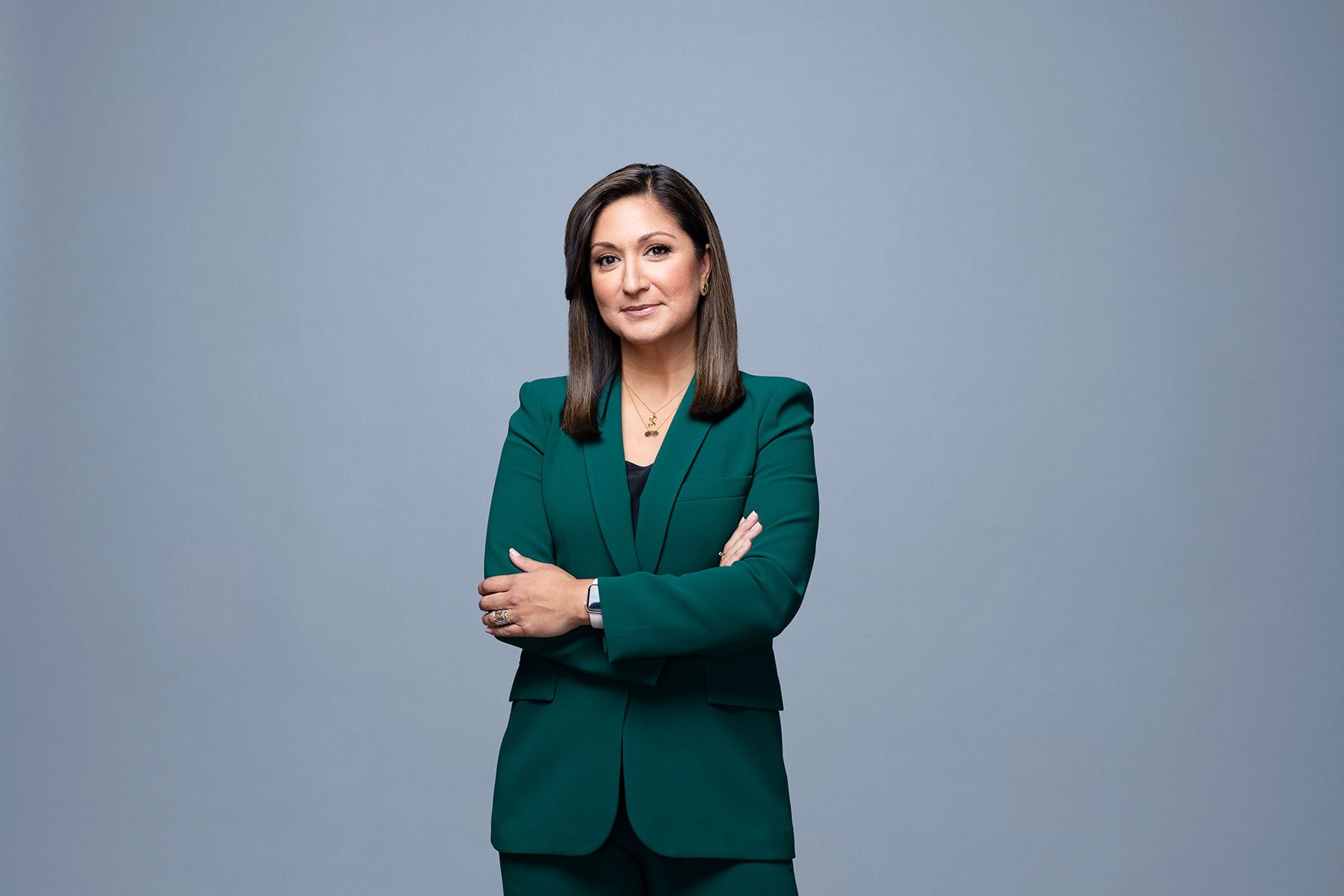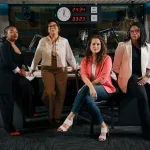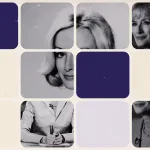Amna Nawaz will be one of two new co-anchors of PBS NewsHour starting on January 2. Nawaz, currently the flagship evening news program’s chief correspondent, and Geoff Bennett will be replacing Judy Woodruff, who on December 30 is stepping down from the NewsHour anchor seat she has held since 2013.
Nawaz is a first-generation American, a Muslim whose family immigrated from Pakistan. She has served as NewsHour’s primary substitute anchor and chief correspondent since joining the program in 2018. She also holds a trio of firsts: the first Muslim, Pakistani-American and first-generation American person to be in the anchor seat at NewsHour. She has often seen herself labeled as “the first” throughout her career. Nawaz spoke with The 19th about how representation, lived experience and motherhood has and continues to shape her career.
Jennifer Gerson: As you get ready to move into this seat, what’s most on your mind? Was this something that you could have ever imagined as an opportunity when you were starting out?
Amna Nawaz: I don’t think that if I went back 20 years and told myself when I started in this industry that I would one day have this job that I would have believed it. There was just never anyone like me in this kind of role. I’m just so overwhelmed, more than anything, with gratitude and humility and also excitement for what’s ahead.
I think it’s a testament to how much the industry has changed in the last 20 years — but also this idea that we are still hitting these kinds of firsts speaks to how this industry still has a long way to go. There’s still a lot of work to be done when it comes to newsrooms and news organizations accurately representing the same audiences and communities we are meant to be serving. That’s an ongoing thing for me that I have thought about throughout my career.
This really is one of those moments where you step back and think, “This is the dream job.” It’s the thing I never thought I would get to do — and I’m so grateful I get to do it.
Why did this kind of role feel like something that was never going to be on the table? What signals were you getting from the industry that this was not an option for you?
This saying is old, but true: If you can see it, you can be it. And I just didn’t see it.
There were very few women in anchor positions. There were very few women of color in anchor positions. There were no Brown women in anchor positions and certainly no Muslim women. I don’t know how many first-generation American women there have been, but I assume not many. All the things that made up who I am and the space I occupy in the world were not represented in these roles — and that’s changed a lot.
I was very lucky to have a number of people who supported me, who encouraged me along the way. And a number of them were women who broke barriers in their own ways. At NBC, I got to work under Lisa Myers and Anne Thompson, two of the most incredible journalists I’ve ever gotten to study at the feet of. I got the chance to travel and produce with Ann Curry, who is still someone I look up to and admire, especially her values around getting out into the field and being there to talk to people and using her platform and privilege to raise up the voices of people who don’t always get to have one. Andrea Mitchell was a huge proponent of mine, bringing me onto her show when I was a young foreign correspondent and supporting my work. Cokie Roberts at ABC and Martha Raddatz there, as well. Then of course Judy Woodruff here at PBS has been a mentor and a guide and an inspiration to me.
Each one of them, they’ve had their own battles, their own walls they have had to break down. But what I carried with me as a lesson from each of them was when you get the chance to be one of the first through that door — as I’ve done for most of my career — one of the most important things you can do is to hold it open to make sure that other people can walk in behind you.
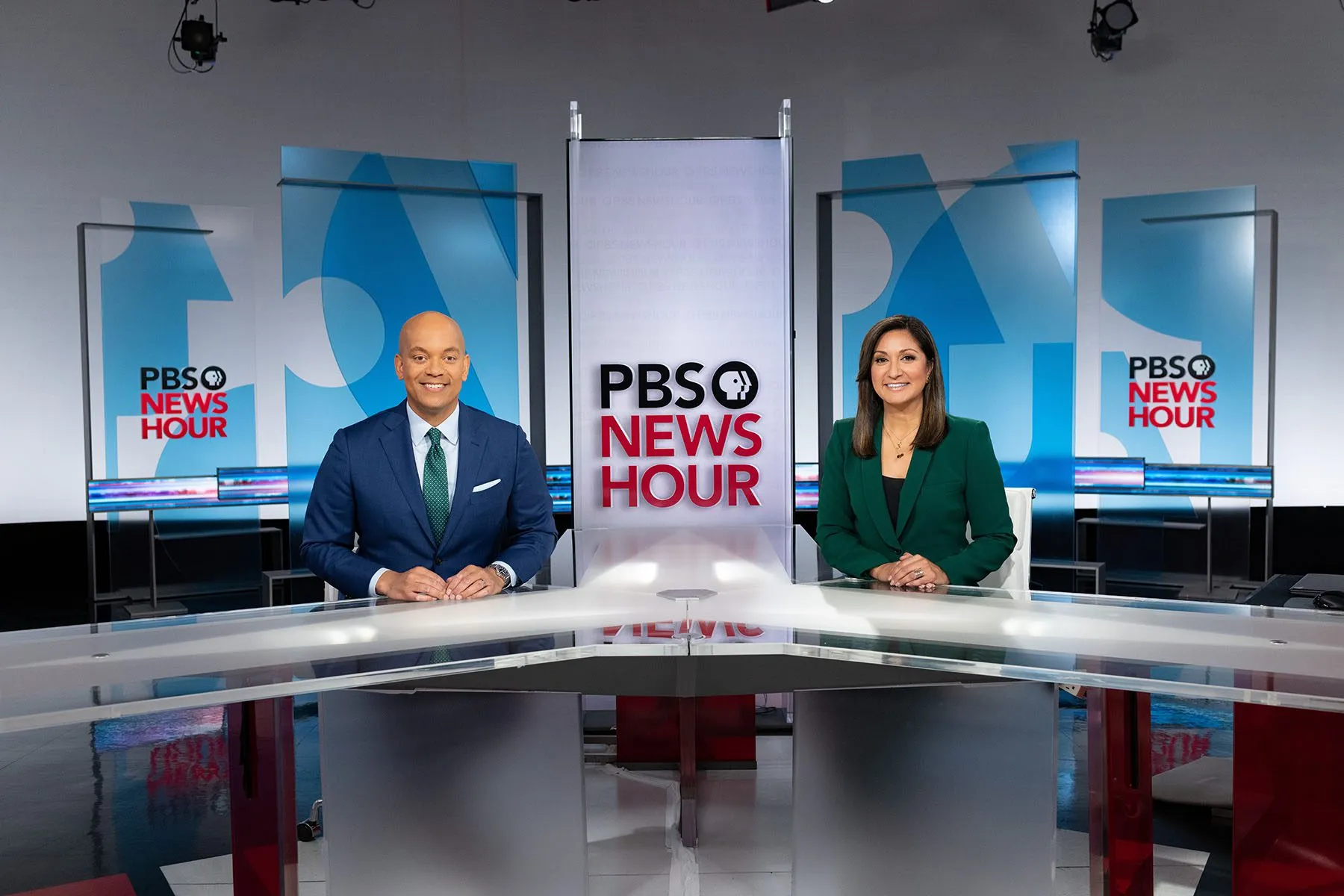
How do you do that in a meaningful way? How do you think news as an industry can take meaningful steps towards representation and accountability?
One approach is practical and organizational. We talk a lot about mentorship and developing young talent. But it has to go beyond that. It has to go beyond just being a mentor, but being a benefactor.
It’s about being the person who gives the opportunity to someone else to go out and prove themselves. Oftentimes, historically and traditionally, people are given jobs on the promise of their potential. But that doesn’t usually apply to women. Women, I feel, are asked to prove they can do the job — and do the job above and beyond what they are doing in their current job — before they can get the job. This makes women second-guess themselves, makes them think, “You know, maybe I’m not actually qualified to go for this.”
I was really lucky that when I could imagine myself in those roles, I would make the case to other people about why they should believe me. And yes, if you do this, you’re going to run into a lot of “no.” But every now and then I would get a “yes.”
On the other side is the actual journalism side, the editorial side. And that’s when it comes down to reminding ourselves that as journalists, we’re in service to a larger audience. When you come up through a career like mine when so often you are “the only” in the room — whether that’s woman or person of color or anything — when you get in that room, you think a lot about who is still not in that room with you.
You have to think to yourself, “Who am I asking questions on behalf of, who is not here to voice their own opinions and questions and concerns themselves?” That attitude has deeply informed my journalism.
How do you explain to someone why thinking about representation in journalism isn’t something that runs in opposition to objectivity and collecting and presenting facts?
When people ask me about my background and lived experiences, I always say that I bring my whole self to this work. What I mean by that is that I know I occupy a unique experience in America — but in many ways, it’s really not at all unique. I mean, think about the millions of people who know what it is to be first-generation American. Think about the millions of people who know what it is like to grow up in a dual-language household. Think about the millions of people who know what it is to be a daughter or a wife or a mother or any of the other identities that I hold. I’m also a Virgo and I like color coding things! And I love chocolate and sports and music. There are so many different parts of my identity that I hold dear and that inform who I am and inform my interests and my journalism.
I don’t believe that any one person or any one identity has a monopoly on objectivity and neutrality. So, when I say I bring my lived experiences to my work, I would also argue that every journalist that has ever come before me — whether it was Walter Cronkite or Peter Jennings or anyone else — also brought their lived experience to their work, too. The difference today is that we have more voices at the table and in the room doing that.
How does being a parent impact how you are even able to do the work of journalism?
This is a perfect opportunity for me to celebrate someone who I don’t get to celebrate enough, my excellent husband Paul [Werdel]. He and I met as journalists and he was a working journalist for years and years and is incredibly accomplished. He was running a team at The New York TImes when I got hired at NewsHour in 2018. He proposed taking a step back from work to go full-time with our kids so I could go and throw myself into this job. It was nothing short of the greatest gift I have ever received.
I think a lot of the pressures and expectations of what it is to be a mother in America really overwhelmed me in the early years of our having children, when the primary and physical care of children really does fall to you as a mom. We have two daughters who are 9 and 7 and who now see the world in a completely revolutionary way, which is to say that they know Daddy is the one who picks them up from school, Daddy is the one who packs their lunches, Daddy is the one who takes them to ballet, Daddy is the one who puts the Band-Aids on the boo-boos. Daddy is the one who is always there for them, and that is a revolutionary thing in America today, which really says something.
We talk a lot about moms and the challenges of motherhood, and I think that mothers disproportionately bear the burden — and particularly over these last few pandemic years — of parenting. But Paul and I are working very hard to change this conversation. This is, of course, a decision of privilege. We are so lucky and privileged and fortunate to be able to even have this conversation — and yes, this requires other decisions and compromises and adjustments in our life. But we were able to make it, and the reality is that most Americans aren’t.
We have a very real child care crisis in this country. Even with one full-time, devoted parent and my demanding job, we still rely on my incredible parents, who live nearby, and my sister, who lives nearby, and babysitters. Even for us, we are still cobbling together a community to just get through the days and we are people of privilege and options. I can’t imagine what the average family has to go through. What most families have to go through in this country is unsustainable.
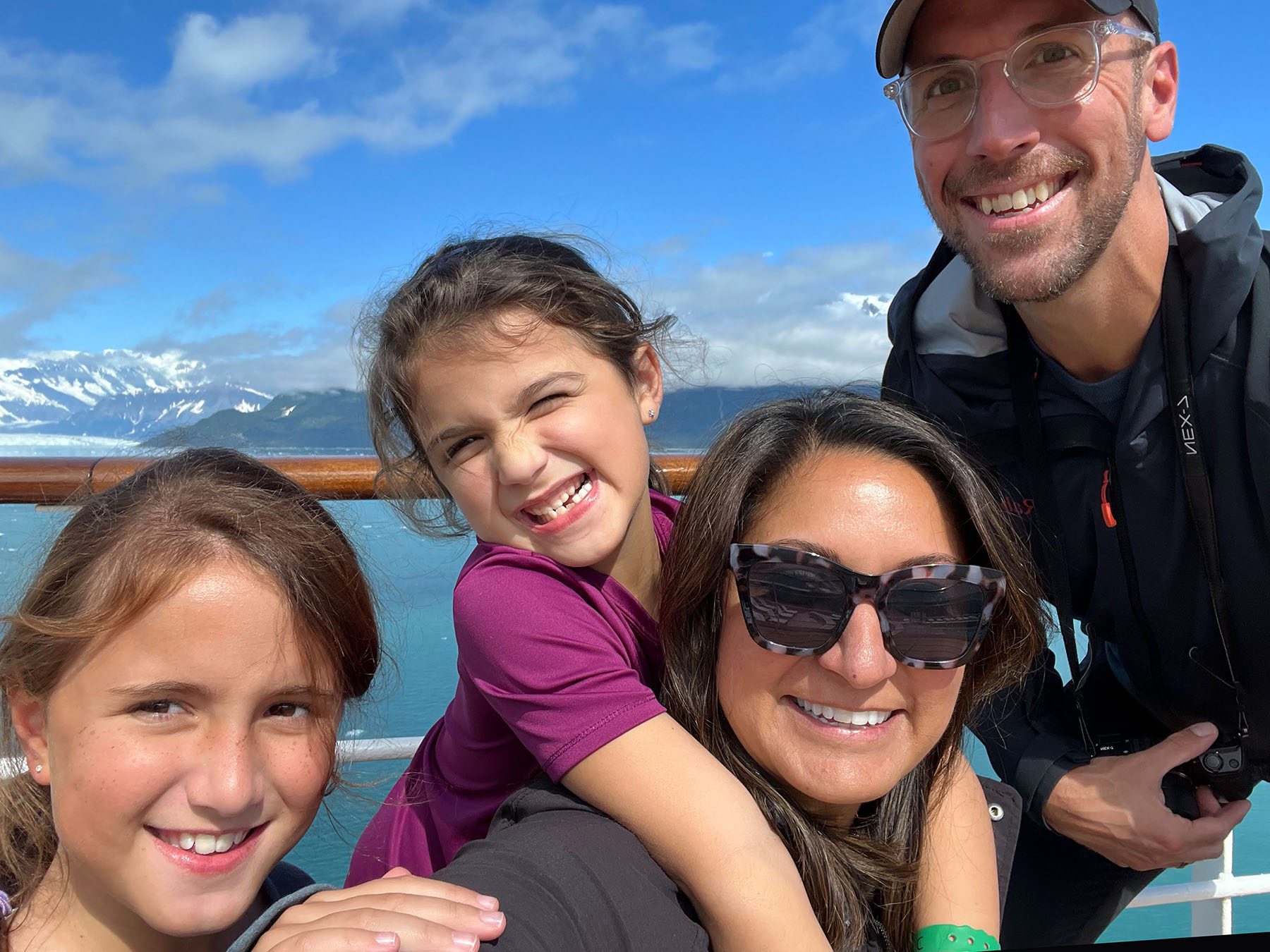
How does this inform what stories you choose to tell on-air and how you tell them?
Our guiding principle is that who is telling a story matters. I won’t say that who is telling it matters more than anything else, but it does matter.
Having children, having daughters especially, has informed my work. It’s undeniable. I can remember covering the family separation crisis under the Trump administration. There was this one story of a young girl who walked across the bridge from El Paso who was ultimately separated from her family for about seven weeks. I was reporting day-to-day, tracking her down, getting recordings of her phone calls with her mom, finding her family, asking the White House and others why it was taking so long to unite them.
I really got to know this little girl. And I had a child of the same age at the time, so I would also be putting my kids to bed at night and rubbing their backs if they had a nightmare or giving them a hug if they were upset about something and I would be wondering, “Who is doing this for her?” It absolutely informed my reporting on this issue.
I think a lot about the rights that will pass on to our daughters. I think we have just lived through a Supreme Court decision that for the first time in modern history has removed rights from a population rather than expanding rights, and I think a lot about the impact that will have on the next generation. I think about climate change and the world that our kids will inherit. I think about what we just lived through in this pandemic. As journalists, we were covering that in real time, as we were living through it, and it has certainly had an enormous impact on this next generation of young kids.
I think anyone who says they don’t bring their lived experiences to this job probably isn’t being 100 percent honest. We don’t pick sides as journalists — this is not about a partisan perspective. It’s not my job to tell you what to think. But it is my job to make you want to think about these things and when it comes to coming down on one side of things, I will always come down on the side of humanity and decency, regardless of the story.
